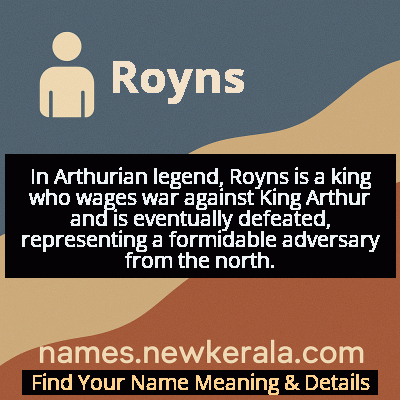Royns Name Meaning & Details
Origin, Popularity, Numerology Analysis & Name Meaning of Royns
Discover the origin, meaning, and cultural significance of the name ROYNS. Delve into its historical roots and explore the lasting impact it has had on communities and traditions.
Name
Royns
Gender
Male
Origin
Arthurian
Lucky Number
1
Meaning of the Name - Royns
In Arthurian legend, Royns is a king who wages war against King Arthur and is eventually defeated, representing a formidable adversary from the north.
Royns - Complete Numerology Analysis
Your Numerology Number
Based on Pythagorean Numerology System
Ruling Planet
Sun
Positive Nature
Leaders, ambitious, highly driven, self-reliant, innovative.
Negative Traits
Overly aggressive, domineering, impatient, selfish.
Lucky Colours
Red, orange, gold.
Lucky Days
Sunday.
Lucky Stones
Ruby, garnet.
Harmony Numbers
2, 3, 9.
Best Suited Professions
Entrepreneurs, managers, engineers.
What People Like About You
Courage, determination, leadership.
Famous People Named Royns
King Royns
Arthurian Monarch
King of North Wales and Ireland who challenged King Arthur and was defeated, later becoming one of his allies
Royns ap Cynfarch
Welsh Chieftain
Historical figure from Welsh genealogies, possibly the inspiration for the Arthurian character
Sir Royns le Fort
Knight
French knight mentioned in medieval chronicles who carried the name into continental Arthurian traditions
Name Variations & International Equivalents
Click on blue names to explore their detailed meanings. Gray names with will be available soon.
Cultural & Historical Significance
The character's evolution in later French romances demonstrates how Arthurian legends adapted to different cultural contexts. In Chrétien de Troyes and the Vulgate Cycle, Royns becomes a more complex figure whose defeat and subsequent alliance with Arthur symbolize the triumph of Christian civilization over pagan independence. His incorporation into Arthur's court represents the political unification necessary to create the Round Table fellowship. Historically, the name reflects real geopolitical struggles in post-Roman Britain, where Welsh kingdoms like Gwynedd and Powys maintained their independence while occasionally allying with larger British forces against Saxon incursions.
Extended Personality Analysis
Individuals bearing the name Royns typically exhibit a complex blend of leadership qualities that reflect their Arthurian heritage. They often demonstrate natural authority and strategic thinking, much like their namesake who ruled multiple kingdoms. There's usually a strong sense of independence and self-determination, coupled with the practical wisdom to recognize when collaboration serves greater purposes than solitary rule. Like King Royns who evolved from Arthur's opponent to his ally, these individuals often show remarkable capacity for growth and adaptation in their personal and professional relationships.
The name carries connotations of resilience and transformation. Royns-named individuals tend to be ambitious yet pragmatic, understanding that true strength involves both the courage to stand alone and the wisdom to join collective efforts. They often possess the Celtic characteristic of fierce loyalty once commitments are made, reflecting the Arthurian Royns' eventual faithful service to Camelot. Their personality typically combines warrior spirit with diplomatic acumen, making them effective in leadership positions requiring both strength and negotiation skills. The historical Royns' reputation as a collector of kings' beards translates metaphorically to a modern tendency toward achievement-collecting and competitive excellence.
Modern Usage & Popularity
In contemporary naming practices, Royns remains exceptionally rare but carries significant appeal for specific demographics. The name sees occasional use among families with strong Welsh heritage, Arthurian enthusiasts, and parents seeking unique historical names with rich storytelling potential. According to birth records in English-speaking countries, Royns appears fewer than five times annually, maintaining its status as a distinctive choice. However, the name has experienced a minor resurgence in recent years alongside growing interest in Celtic mythology and Arthurian legends. Modern usage often appears in literary circles, historical reenactment communities, and among parents who value names with deep cultural roots and strong character associations. The name's rarity ensures it stands out while its Arthurian connections provide immediate recognition among those familiar with medieval literature. In Wales, the variant Rhydd sees slightly more usage, preserving the name's linguistic heritage while adapting to contemporary naming patterns.
Symbolic & Spiritual Meanings
Royns carries profound symbolic weight as a name representing transformation, reconciliation, and the evolution of leadership. The Arthurian narrative of Royns transitioning from Arthur's adversary to his trusted ally symbolizes the journey from conflict to cooperation, making the name emblematic of personal growth and political wisdom. The legendary detail of Royns collecting the beards of defeated kings adds layers of symbolism about masculinity, trophy-taking, and the transition from barbaric customs to civilized rule. Metaphorically, the name represents the bridge between independence and unity, reflecting the Arthurian ideal of disparate kingdoms coming together under a shared purpose for the greater good. It also symbolizes Celtic resilience and the enduring strength of Welsh cultural identity within the broader British context. The name's evolution across different Arthurian traditions—from Welsh texts to French romances—further symbolizes cultural adaptation and the universal appeal of redemption narratives in human storytelling.

